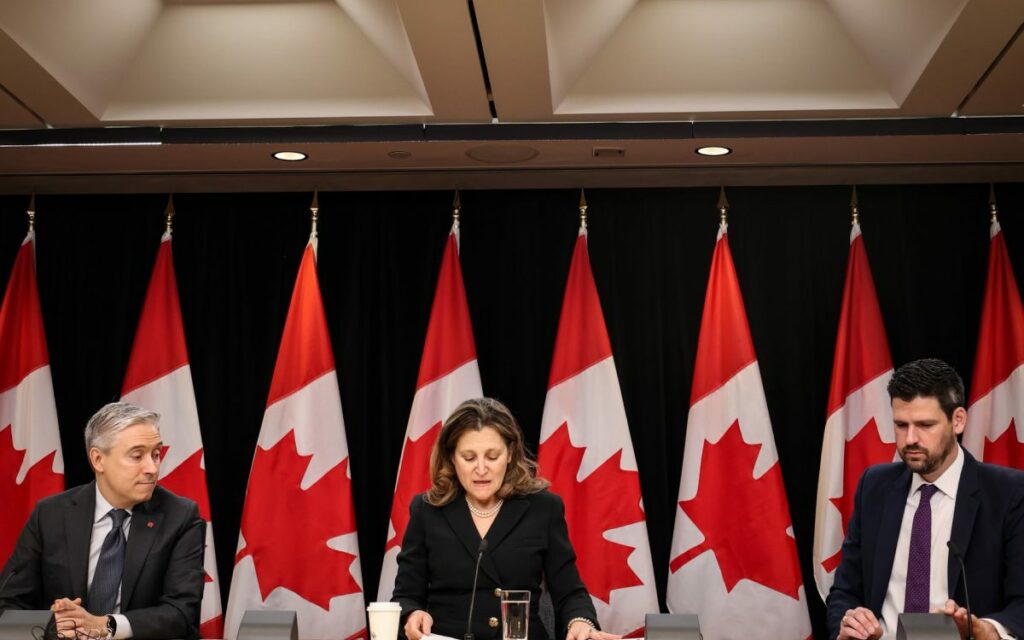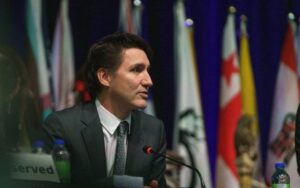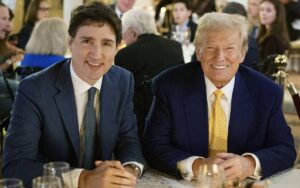
The solution is not more surtaxes or tariffs but working toward a more competitive Canadian economy overall with less government tinkering and intervention. Pictured: Deputy Prime Minister and Minister of Finance Chrystia Freeland with two cabinet colleagues. Photo Credit: Chrystia Freeland/X.
It was surprising, and long overdue, to hear that Deputy Prime Minister and Finance Minister Chrystia Freeland has discovered that competition from China is an issue for Canadian business. Earlier this week, Freeland announced a 30-day consultation period for input on whether or not the government should impose surtaxes on electric vehicles (EVs) produced in China. She claimed that China was producing far more EVs than their domestic market could consume so is exporting them at low cost to Canada and other international markets, unfairly competing with domestic manufacturers.
News flash to Chrystia – this has been going on for years in the broader manufacturing and other business sectors, not just in the automotive industry. It’s nice that she’s waking up to this all of a sudden, but a little late in the day. It’s also likely that this particular issue caught her eye because it is taking place in one of the government’s pet industries – electric vehicles. They have largely had a deaf ear to identical complaints of others in the manufacturing sector and elsewhere.
The Trudeau government has significantly damaged the competitive position of all Canadian businesses, and especially those who compete internationally. Things like our multiple carbon taxes, absurd delays and red tape around resource and other major projects, regulatory changes that increase uncertainty such that investors are steering clear of Canada, high and increasing overall tax levels, excessive growth in the size and cost of government, foolish policy changes like the recent capital gains tax hike with zero consultation and so much more.
As for the EV sector, it is laughable to think that this part of the economy needs even more government intervention than has already taken place. Billions of tax dollars have already been spent to induce consumers to buy EVs and to subsidize the production of EV batteries and other elements of the vehicles. Despite all this, demand for EVs is falling and its looking like all of these billions will join the ranks of other government-led “industrial strategies” in being a colossal waste of money and resources.
When most Canadians hear “manufacturing” they likely think first of the auto sector, even though that sector represents less than 10 per cent of the total manufacturing output of Canada. Part of this is likely because of the very vocal and strident positions taken by auto sector unions. When reviewing past large subsidies to the industry, they often did not go toward helping the business become more competitive but to do things like shore up underfunded employee pensions, such that all taxpayers were paying for rich pensions for auto workers instead of being able to put aside sufficient funds for their own retirement. Other manufacturers do not receive anywhere near the political attention nor government support that auto manufacturing does. And when scarce tax dollars support one sector, it just means that the successful businesses who don’t constantly have their hands out to government are disadvantaged, as are taxpayers in general.
Canada is by no means the only country to heavily subsidize the auto sector. A key part of US President Joe Biden’s “Inflation Reduction Act” mega-spending is also focussed on EVs. Other developed countries also have special measures for auto manufacturers. About a decade ago, Australia opted for a different approach. After years of heavy subsidies of automakers, an appreciation in the Australian dollar because of a resource boom meant that the country’s auto industry exports were uncompetitive. The government was faced with the decision of paying even more subsidies or to let the industry die. They chose the latter, and today most autos are imports. Although there were certainly difficult transition issues, it seems the country accepted the inevitable and ultimately is none the worse for it. Although Canada has many similarities with Australia, it is unlikely we will see our auto sector disappear as it is very integrated with the mammoth US auto industry.
Canada’s Liberals suddenly expressing concern about competition from China – which not only faces much lower labour costs but also no carbon taxes, much less costly regulation, human rights legislation, high energy costs etc. – is a change as they haven’t seemed all that worried about it in the past. There was the appalling incident back in 2019 when then-Finance Minister Bill Morneau chose to remove a surtax from various steel products that were essentially being dumped into Canada by Chinese steel companies to the detriment of the Canadian steel industry.
Many manufacturers have found that despite getting favourable rulings from the trade tribunal that foreign competitors were breaking our trade rules, they have not been supported by the Liberal government. As well, in some instances even if the product from China was slapped with high tariffs or added surtaxes because they weren’t playing by the rules, the Chinese company involved just re-routed their products via another country such as Thailand and pretended all was well. For too many Canadian manufacturers, this becomes a losing game of whack-a-mole where many costly legal expenses are paid for a situation that is never resolved, and no help is forthcoming from government.
As for the “30-day consultation period” Freeland has announced, it is likely to be as useless as other so-called consultation exercises this government has conducted. Having participated in many such consultations during the tenure of this government, this author has found they are not genuine consultations where the government welcomes informed input from the business sector involved, but rather processes in which only the views of participants who agree with the Liberals’ existing opinions are considered. Input from businesses and other experts who contradict positions held by the government are ignored, no matter how factual and well-documented. This Liberal government has a track record of poorly designed policies followed by even worse implementation, and one of the key reasons for this is that they only listen to people that agree with them, not to knowledgeable experts who actually understand the issues involved and can back them up by solid research.
In general, international trade is a positive for any economy as long as it takes place in a reasonably fair and balanced context. The federal Liberal government has greatly increased the cost of doing business in Canada, especially for manufacturers, tilting the playing field to the disadvantage of Canadian firms. Many provincial policies have not helped either, notably those involving electricity price increases, labour legislation, taxes and the proliferation of red tape. It is hardly surprising to see that these policies have damaged our competitive position internationally as they contribute to declines observed in Canadian economic productivity. The also weaken our currency, which worsens inflation as Canada imports a great deal from other countries.
For the federal Finance Minister to appear suddenly concerned about this is disingenuous at best, dishonest at worst. The solution is not more surtaxes or tariffs but working toward a more competitive Canadian economy overall with less government tinkering and intervention. Canadian businesses are very much up to the challenge, but it is hard to compete when your own government is doing everything it can to stand in your way.

She has published numerous articles in journals, magazines & other media on issues such as free trade, finance, entrepreneurship & women business owners. Ms. Swift is a past President of the Empire Club of Canada, a former Director of the CD Howe Institute, the Canadian Youth Business Foundation, SOS Children’s Villages, past President of the International Small Business Congress and current Director of the Fraser Institute. She was cited in 2003 & 2012 as one of the most powerful women in Canada by the Women’s Executive Network & is a recipient of the Queen’s Silver & Gold Jubilee medals.




















